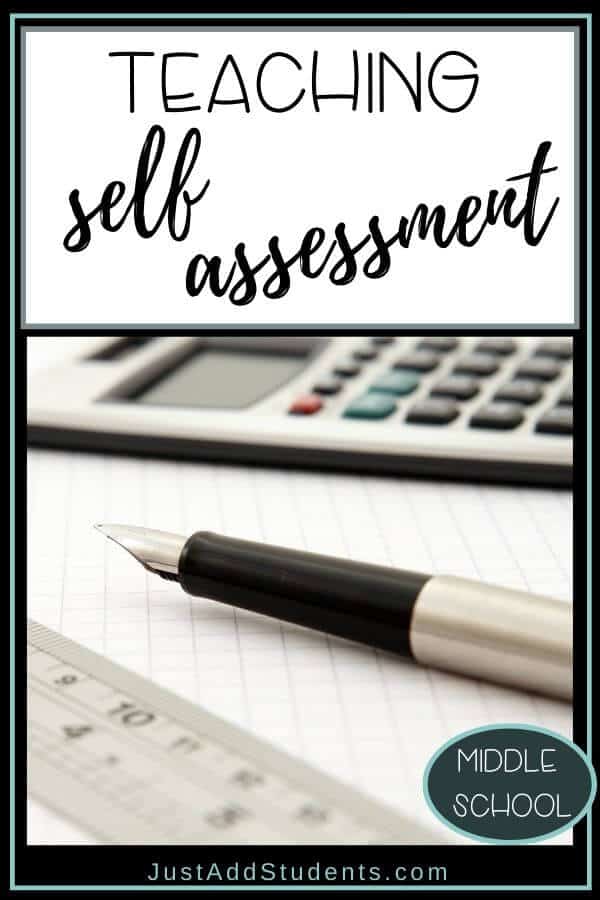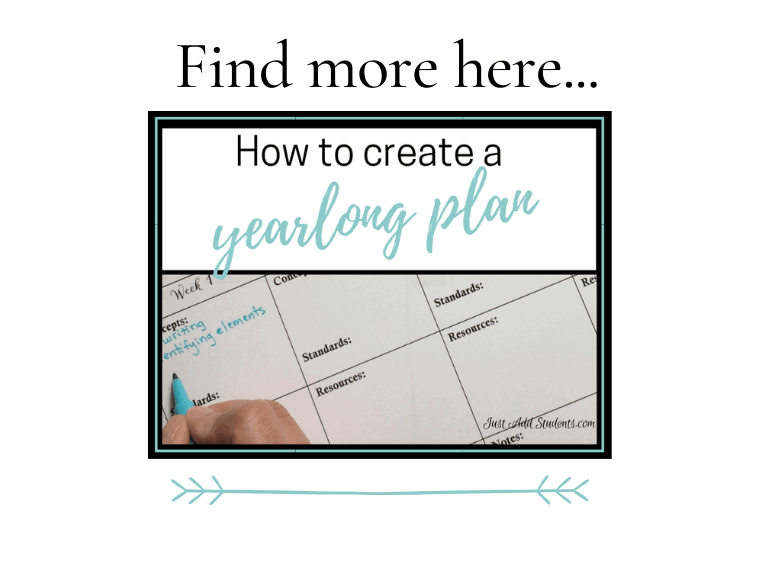Are you teaching your students self-assessment skills? Teaching this life skill is so important in helping our students gauge their growth. This post takes you through many ways to teach this.
Let’s get started!
When should students self-assess?
Looking back at our accomplishments over time is so gratifying!
We can bring that same joy of accomplishment to our students by scheduling regular self-assessments.
The perfect time to do that?
- when students complete a project or essay
- at the end of a grading period
- when the semester ends
- at the end of the school year
- beginning or end of the month
In other words — you can choose any time for students to practice self assessment!
Remember that you need to have something for students to self-assess. Be sure you provide the focus for this activity.

Self assess when projects are finished
When students have finished a project, essay, or even unit have them complete a self assessment.
This can be just a simple series of questions:
- what was the most challenging part of this assignment?
- how did you grow as a writer or reader through this?
- what did you learn about yourself?
I always like to add:
- what would you like your teacher to know?
This last question gives students an opportunity to voice their opinion and perhaps share a bit of themselves with you.
Always do this:
Assure students that their assessment won’t impact their grade.
You may want to even collect the self-assessments at a different time. Additionally, you can wait to read them until after you’ve finished grading.
How does this help you as a teacher?
You’ll get instant feedback from your students on important things like pacing (did they have enough time?) and interaction with you (did they meet with you for a conference?)
You will also get an idea of the types of assignments your students respond to. Did they enjoy writing an argument? or poetry? This can help you plan units or even set up your yearlong plan based on your students’ responses.
Additionally, you’ll be better able to help your students write and meet their goals.

At the end of the grading period
The end of the grading period usually brings a huge sigh of relief along with it. Time for a break!
But before closing the chapter on a grading period, give your students a chance to self-assess their growth.
This is the perfect opportunity for you to share the concept of growth mindset. Take time to allow your students to think about how they view their own successes and failures.
Asking students to think about their work up can give both you and your students insight into how the rest of the year should progress. That reflection is also the perfect segue into goal setting for the next grading period.
End of grading period self-assessment tips
First: Brainstorm with your students a list of activities you’ve worked on so far this school year: book clubs, writing projects, blogging, research, experiments, independent reading, etc.
Encourage your students to use their planners (they do use planners, don’t they?!) to review what they’ve worked on this grading period.
Make your list as extensive as possible. Step back and sigh! You have worked hard (and I’m talking about the teacher here!!!). Take a picture of your list and include it on your class blog or parent notes!
Second: Provide students with a few questions. You can use the free questionnaire I created for students (you can find a free one here) or you can create your own questions.
Ask students what they liked doing best, what they would like to do more of, how they improved so far this school year. Keep the questions positive — directing students to focus on where they have improved or seen growth in themselves.
If students keep a writing or project portfolio, they should review all the work they’ve. I love doing this! I remember one year a student looked at the first writing assignment of the year and said loudly, “Did I write this? It’s horrible!” She obviously had felt she’d grown as a writer!
Finally: Be sure to include in the self-assessment an opportunity for looking ahead. What goals do students have for the next grading period? What else would they like to accomplish this school year?
If you have time, you may want students to set goals for the next grading period at this time.
Self-assessment at the end of the year
If you can’t have students self-assess regularly throughout the year, don’t miss the opportunity at the end.
Even a simple questionnaire will help both you and your students reflect.
How can this help you as a teacher?
You should review your students’ self-assessments.
Why?
They will provide you with insight into your students AND into your teaching.
Reviewing how a student felt about a particular writing assignment can be so insightful! Did you provide enough time and support? Was the assignment engaging?
Here’s the thing you cannot do, though:
Don’t take your students’ feedback personally!
Easier said than done, I know!
But, if we expect our students to respond to feedback in a growth mindset way then we need to as well!
Consider your students’ reasonable feedback about how you can improve your teaching or assignments. You may get negative feedback that doesn’t reflect on your teaching like, “I hate writing assignments.”
Well, you can’t do anything about that!
But,
“There wasn’t time to schedule a conference with you” is a legitimate comment and something you can work on to address. (Hint: Use checklists!)
Self-assessment is powerful
Students aren’t often given the opportunity to really think about why they were (or weren’t) successful with an assignment or class.
It is always easier to blame the teacher or subject matter – but self-assessment give them a chance to simply think about the cause effect relationship between their actions and the products they produce.
And it works both ways!
We can see how we, as teachers, have opportunities to grow as well. Were we prepared? Did we give our students enough feedback? Were we available for conferences?
You can also have students save and review their self-assessments. If they are writing the same thing over and over again, are they growing? Are they taking their assessments to heart? Another good teaching moment!
Giving students an opportunity to assess their own growth is a lifelong tool!
Happiness always!




Great ideas for promoting a growth mindset!
Lovely idea for students to reflect and gain insight into what students like also! It’s a great way to boost self confidence.
Marypat, thank you for the friendly reminder to pay attention to the importance of reflection and self assessment. Growth seems slow or nonexistent unless we look back at some sort of data. When we see it in black and white it is clear that what we thought didn’t exist, was truly growing by leaps and bounds.
Self-assessments have made such a huge difference in my students’ achievement. Thanks for the great blog post!
A great idea to boost self confidence and for student to really think about how much they’ve accomplished! Thank you.
I think it’s so important to have students experience self-reflection. I did a similar activity with my students at the end of 1st quarter. I had spent so much time bragging on them during parent conferences that I wanted them to have a chance to think about their progress. This fits perfectly with our growth-mindset goals this year! Thanks for the reminder as we wrap up December!
I like your idea of a midyear self-assessment. Very nice reflective activity for students.
Thanks for the article! Self assessments are a great idea for students of all levels. Even students who are working below grade level can still be proud of doing better than the beginning of the school year.